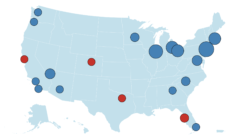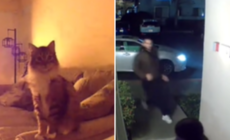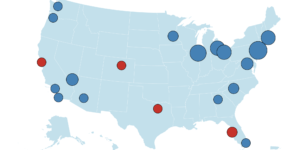-
Here Are the Best Rides at Universal’s New Epic Universe Theme Park in Orlando - 9 mins ago
-
Nintendo Direct Coming This Week – Where to Watch and What to Expect - 34 mins ago
-
‘Anybody but Mamdani’: 5 Groups Emerge to Raise Millions in Attack Funds - 53 mins ago
-
Map Shows Where House Prices Are Rising and Falling Fastest - about 1 hour ago
-
Ozzy Osbourne’s Coffin Will Be Taken Through His Hometown’s Streets Before Funeral - 2 hours ago
-
Dog’s Reaction To Hearing Best Friend Is Coming Over Delights Internet - 2 hours ago
-
Astros Deadline News: Team Increases Interest in Padres Pitcher Dylan Cease - 2 hours ago
-
NISAR — a NASA-India Collaboration — Will Study Earth With Radar. Here’s How to Watch the Launch. - 2 hours ago
-
Study: Pandemic aged our brains faster, whether or not we got COVID - 3 hours ago
-
Couple Check Pet Cam, Realize Cat Is Trying To Warn Them About Something - 3 hours ago
Supreme Court joins Trump and GOP in targeting California’s emission standards
WASHINGTON — The Supreme Court on Friday joined President Trump and congressional Republicans in siding with the oil and gas industry in its challenge to California’s drive for electric vehicles.
In a 7-2 decision, the justices revived the industry’s lawsuit and ruled that fuel makers had standing to sue over California’s strict emissions standards.
The suit argued that California and the Environmental Protection Agency under President Biden were abusing their power by relying on the 1970s-era rule for fighting smog as a means of combating climate change in the 21st century.
California’s new emissions standards “did not target a local California air-quality problem — as they say is required by the Clean Air Act — but instead were designed to address global climate change,” Justice Brett M. Kavanaugh wrote, using italics to described the industry’s position.
The court did not rule on the suit itself but he said the fuel makers had standing to sue because they would be injured by the state’s rule.
“The fuel producers make money by selling fuel. Therefore, the decrease in purchases of gasoline and other liquid fuels resulting from the California regulations hurts their bottom line,” Kavanaugh said.
Only Justices Sonia Sotomayor and Ketanji Brown Jackson disagreed.
Jackson questioned why the court would “revive a fuel-industry lawsuit that all agree will soon be moot (and is largely moot already). … This case gives fodder to the unfortunate perception that moneyed interests enjoy an easier road to relief in this Court than ordinary citizens.”
But the outcome was overshadowed by the recent actions of Trump and congressional Republicans.
With Trump’s backing, the House and Senate adopted measures disapproving regulations adopted by the Biden administration that would have allowed California to enforce broad new regulations to require “zero emissions” cars and trucks.
Trump said the new rules were designed to displace California as the nation’s leader in fighting air pollution and greenhouse gases.
In a bill-signing ceremony at the White House, he said the disapproval measures “will prevent California’s attempt to impose a nationwide electric vehicle mandate and to regulate national fuel economy by regulating carbon emissions.”
“Our Constitution does not allow one state special status to create standards that limit consumer choice and impose an electric vehicle mandate upon the entire nation,” he said.
In response, California Atty. Gen. Rob Bonta said “the fight for fight for clean air is far from over. While we are disappointed by the Supreme Court’s decision to allow this case to go forward in the lower court, we will continue to vigorously defend California’s authority under the Clean Air Act.”
Some environmentalists said the decision greenlights future lawsuits from industry and polluters.
“This is a dangerous precedent from a court hellbent on protecting corporate interests,” said David Pettit, an attorney at the Center for Biological Diversity’s Climate Law Institute. “This decision opens the door to more oil industry lawsuits attacking states’ ability to protect their residents and wildlife from climate change.”
Times staff writer Tony Briscoe, in Los Angeles, contributed to this report.
Source link


















